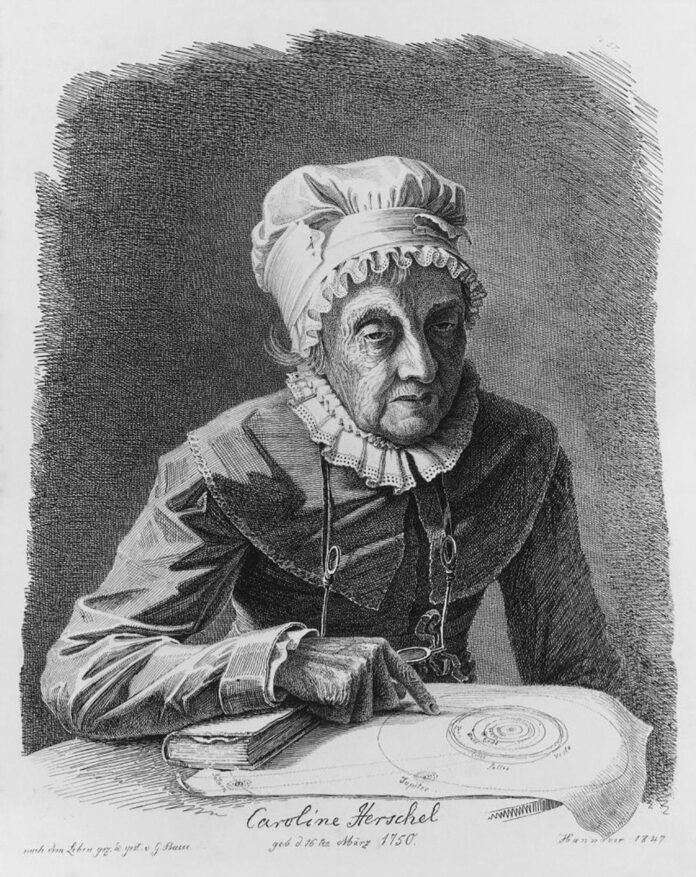The 57 densely handwritten pages of a little booklet, on display one precious leaf at a time in the music room of the Herschel Museum of Astronomy in Bath, cost the museum £108,000, making it by far the institution’s most expensive acquisition.
The memoirs bear poignant witness to the remarkable woman who once lived there, Caroline Herschel, whose £50-a-year salary from George III made her the world’s first known professional woman astronomer, and whose history the museum is trying to weave back into the house.
Caroline was the sister, housekeeper, unpaid assistant and finally salaried professional partner of her far more famous sibling William Herschel. William discovered the planet Uranus from observations made in the back garden of their modest Georgian house in Bath. But Caroline’s story, including her discovery of eight comets and 14 nebulae, has always been overshadowed, literally—the museum displays a handsome pastel portrait of William, but only has a silhouette of Caroline as a young woman, and an unflattering engraving in old age. Curator Isabel Wall explains that the manuscript is part of the museum’s plans to correct the record. “It is a really important acquisition for us,” she says.
Caroline wrote the memoir in 1836, when she was 86, in English and German. Most of the museum’s original objects are loans, except another possession of Caroline’s—her visitors’ book, which records the house welcoming aristocrats, scientists and even royalty. When a private sale of the diaries was scheduled at Christie’s auction house, a fundraising campaign—which included a £50,000 Arts Council England/V&A Purchase Grant Fund and grants from the National Heritage Memorial Fund and Friends of the National Libraries—ensured they were kept from a likely sale to the US, where there are several collectors of Herschel materials.
The 57 pages only cover the years 1755 to 1775, from Caroline’s childhood in Hanover in a large family of musicians to her first years in Bath, and now contain many passages cut from the publication after her death. Her stories include a startling glimpse of another brother who came to Bath, Alexander—whose tangled love life is another running tale. Alexander was roped in to help her with an experiment and ended up perched on the roof and clinging for dear life to a chimney: “I shuder on recollecting the dangerous situation he was in when the gages of the 20ft mirror were struck standing at the top of the house supporting himself with his left arm on a chimney stak whilst with the right out full strech he was guiyding the plumb-line,” she writes.
The house itself bears witness to the perils of 18th-century astronomy: the shattered floor of the back kitchen marks the spot where molten metal for casting a telescope mirror overflowed and exploded. Caroline recorded that “both my brothers and the caster and his men were obliged to run out at opposite doors for the stone flooring (which ought to have been taken up) flew about in all directions as high as the ceiling”.

The Herschel Museum of Astronomy in Bath was home to Caroline and her more famous brother, William, from the late 1700s to the early 1800s. Caroline discovered eight comets and 14 nebulae © Herschel Museum of Astronomy—Bath Preservation Trust
William came to Bath to work as a musician in 1766 and later invited Caroline, 12 years his junior, to join him as housekeeper and companion. The memoir tells how difficult she found her early years in England: “I may here remark that I still was and remained almost throughout my long life without a Friend to whom I could have turned for comfort or advice when I was surrounded by trouble and difficulties. This was perhaps in consequence to my very dependent situation, for I never was allowed to form any acquaintance with any other but such as were agreeable to himself. And before I had lerned English enough to understand or to make myself understood by strangers I was chiefly left to my own society.”
From Mozart to Uranus
The siblings were still musicians and only keen amateur astronomers when William discovered Uranus from observations in their back garden using a homemade telescope. The fame of this discovery changed their lives: William was offered a pension and the position of personal astronomer to George III, and they moved to Datchet and then Slough to be near the king at Windsor castle—initially at a considerable loss on their earnings as musicians.
Caroline worked for years as William’s assistant—feeding him snacks and reading books including Don Quixote and The Arabian Nights to keep him going through the hours of exhausting work grinding and polishing mirrors. But she also made her own observations. On 1 August 1786, she discovered her first comet and, the following year, her paper on this discovery, the first recorded by a woman, also became the first by a woman to be read at the Royal Society, winning her her own salary from the king. The Royal Society published her corrected and expanded edition of the Astronomer Royal John Flamsteed’s star catalogue and then awarded her a gold medal in 1838. She later became one of the first women admitted as a member of the Royal Astronomical Society. She returned to Hanover after William’s death in 1822 and died there in 1848.
The house, their only surviving home, was saved in the 1970s when it was bought for the Bath Preservation Trust, at a time when the whole street was threatened with demolition for a road scheme.
“She was a really remarkably woman, and she deserves to be so much better known,” Wall says. As part of making amends, the museum is now the Herschel Museum of Astronomy, dropping William’s name, to reflect the fact that the narrow house once held two astronomers whose combined work forever changed the world’s view of the skies.
• Herschel Museum of Astronomy, open Tuesday-Sunday, New King Street, Bath

























